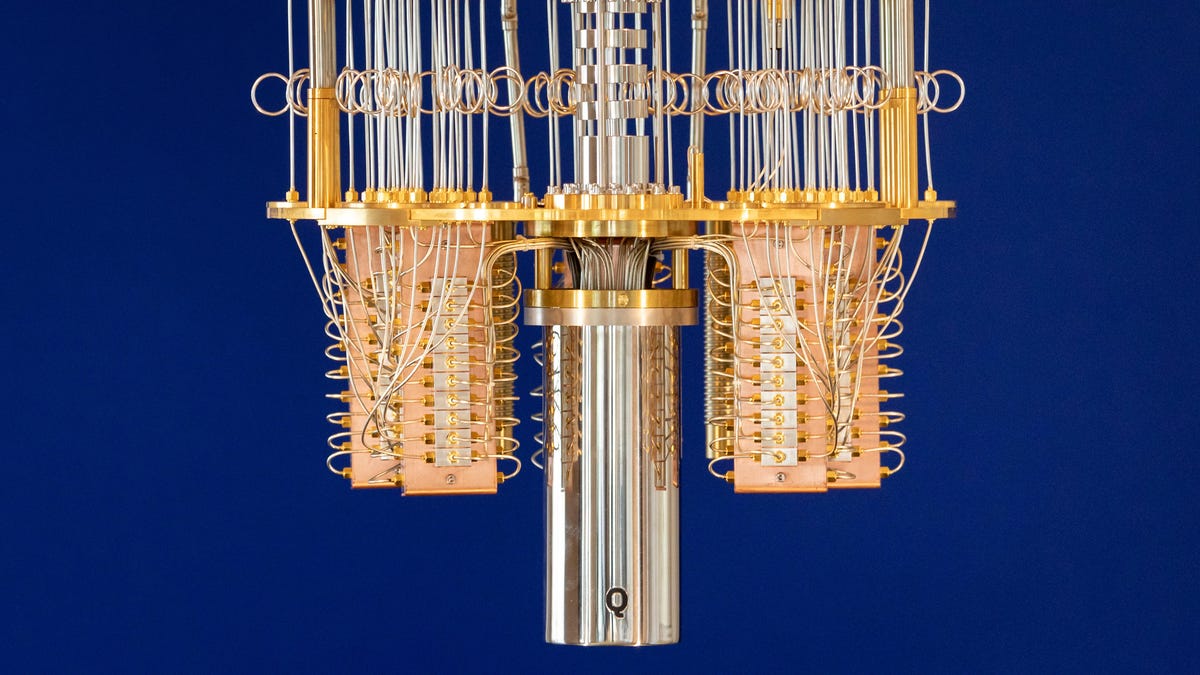IBM now has 18 quantum computers in its fleet of weird machines
That's actually a lot given how expensive, finicky and complex quantum computers are.

IBM now has 18 quantum computers, an increase of three this quarter that underscores the company's effort to benefit from a revolutionary type of computing. Dario Gil, head of IBM Research and a champion of its quantum computing effort, disclosed the number at the Big Blue's Think conference Wednesday.
Eighteen quantum computers might not sound like a lot. But given that each one is an unwieldy device chilled within a fraction of a degree above absolute zero and operated by Ph.D. researchers, it's actually a pretty large fleet. In comparison, Google's quantum computers lab near Santa Barbara, California, has only five machines, and Honeywell only has six quantum computers.
Quantum computing is no longer in its infancy, but it's probably only made it to early toddlerhood. The technology today remains exotic and expensive, with largely unproven benefits. But companies like IBM, Google, Microsoft, Intel and Honeywell along with startups like IonQ, Quantum Circuits and Rigetti Computing are racing to bring quantum computing to maturity. Their hope is to cash in on customers' desire to solve classes of computing problems that are impossible for conventional computers.
IBM's fleet of quantum computers has increased to 18.
You're not likely to ever have your own quantum computer since they're so hard to operate, surrounded by hulking cooling equipment and isolated from outside interference that spoils calculations. Instead, you'll be able to tap into them via cloud computing services. So far, 230,000 people have done so with IBM's Q Experience, Gil said.
IBM is working to make its quantum computers accessible to mere mortals, not just those who understand the weird physics concepts like superposition and entanglement that make quantum computers tick. It's doing so by packaging computational operations into standard recipes it calls circuits that apply a sequence of transformations to qubits, the quantum data storage elements that are far more adaptable than conventional computers' bits.
Quantum computing circuits
One sequence of operations forms a circuit to help JP Morgan Chase set prices for financial derivatives and another helps Daimler perform physics simulations to try to improve electric vehicle battery chemistry.
Computing will become a hybrid approach with libraries of quantum computing circuits embedded in classical programs, Gil predicted. And a third flavor, computers inspired by the neurons in human brains, will add another option.
"It is not that one will eat the other," Gil said. "The most profound implication of what is happening today in computing is the convergence of bits, neurons and qubits."
IBM believes those quantum circuits, embedded within ordinary software, will make quantum computing much more broadly accessible. And now it's begun a new business strategy of touting the approach -- "circuits as a service."
"That's where we're going," Gil said in a CNET interview. "If we do that well, that's going to expose quantum computing to a much larger group of humans."
Dario Gil, head of IBM Research, shows off one of IBM's 18 quantum computers during its Think conference.
IBM will still offer low-level access to its systems for those who want to squeeze the most out of the hardware, though.
Tirias Research analyst Kevin Krewell likes the strategy. "Rather than reinventing a programming language, they added libraries for Python," a widely used conventional programming language. "But you can also get 'dirty' with the Qiskit platform," IBM's low-level quantum programming tools, he said.
Doubling quantum computing performance annually
IBM is on a path to at least double the performance of its quantum computers every year, something it's done for four years running so far. It scores its machines on a measurement it invented called quantum volume, which tracks both the number of qubits in a machine and the reduction in error rates that hobble quantum calculations.
IBM's quantum computing rivals haven't generally signed up to use the same benchmark, but the most notable one that has is Honeywell. It's building a different variety of quantum computer -- an ion trap machine that can run at somewhat less frosty temperatures than IBM's superconducting designs. And Honeywell promises its machines will increase quantum volume by a factor of 10 each year, a much faster pace than IBM.
Gil said he's confident of IBM's approach for years to come, though, which is backed by insights gleaned from IBM Research's investigations. IBM's top-performing quantum computer, codenamed Paris, has 53 qubits. IBM will increase that with a larger system later this year that Gil declined to detail, but he said Big Blue's approach will work beyond a million qubits.
That progress will come in part by miniaturizing hardware and stuffing more of it into the cryostat -- the supercooled chamber that houses the quantum computing processor and a complicated arrangement of wires that carry microwave signals used to operate it, Gil said. Part of that change will come through processor technology better able to run at such cold temperatures.
Is Gil worried Honeywell will leapfrog IBM? Ion trap machines have potential, but "we've done our homework," he said. Honeywell didn't immediately respond to a request for comment.
Operating a cloud computing service is also tough, Gil said. But he welcomes the competition. "It's a great thing that Honeywell is pushing an ambitious road map."

